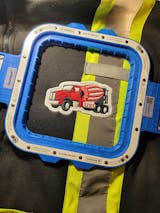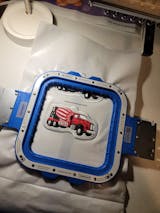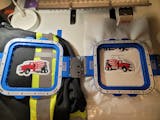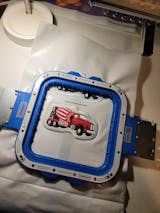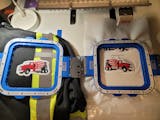1. Introduction to Embroidery Hat Costs
Embroidery hat pricing is a maze—twisting through a landscape of design choices, fabric types, and order sizes. If you’ve ever wondered why a simple logo cap can cost $15 while a premium trucker with intricate stitching might top $30, you’re not alone! In this guide, you’ll uncover the real reasons behind the numbers: from price ranges and key cost factors to smart comparison strategies and proven ways to save money. Whether you’re running a business or just want a batch of custom hats for your team, understanding hat embroidery machine price factors helps budget planning. We’ll preview how bulk orders, design tweaks, and supplier choices can make a huge difference. Ready to demystify hat embroidery costs and keep your budget on track? Let’s dive in!
Table of Contents
- 1. Introduction to Embroidery Hat Costs
- 2. Embroidery Hat Price Ranges and Market Overview
- 3. Key Factors Influencing Embroidery Hat Costs
- 4. Comparing Embroidery Hat Costs Across Suppliers
- 5. Pricing Strategies for Embroidery Businesses
- 6. Cost-Saving Strategies and Mistake Avoidance
- 7. Detailed Cost Breakdown for Embroidery Hats
- 8. Conclusion: Smart Approaches to Hat Embroidery Budgeting
- 9. Frequently Asked Questions
2. Embroidery Hat Price Ranges and Market Overview
Understanding the cost of embroidered hats is like peeling back the layers of an onion—each layer reveals new factors that shape the final price, including how much are embroidery machines for production. Let’s break down the market landscape so you can see exactly where your project fits in.
2.1 Average Pricing by Hat Type and Quality Tier
Not all hats are created equal, and neither are their price tags. The type and quality of your chosen hat play a starring role in determining the final cost per piece. Here’s how the numbers stack up across popular styles and order sizes:
| Hat Style | 24 Units | 50 Units | 100 Units |
|---|---|---|---|
| Budget Embroidered Dad Hat | $19.25 | $15.25 | $13.25 |
| Yupoong Trucker | $20.25 | $16.25 | $14.25 |
| Richardson 115 Lo-Profile | $21.50 | $17.50 | $15.50 |
| Richardson 111 Trucker | $22.00 | $18.00 | $16.00 |
- Budget-Friendly: Custom budget dad hats start around $19.25 for 24 units, dropping to $13.25 at the 100-unit mark. These are the go-to for organizations watching their pennies.
- Mid-Range: Yupoong truckers, a favorite for their balance of quality and cost, range from $20.25 (24 units) to $14.25 (100 units).
- Premium: Richardson trucker hats command higher prices, with the 115 Lo-Profile at $21.50 (24 units) to $15.50 (100 units), and the 111 Trucker topping out at $22.00 down to $16.00.
What about single hats? Expect to pay a premium—often $22 or more for a basic 5-panel cap. The more you order, the less you pay per piece.
2.2 Quantity-Based Pricing Structures
Order size is one of the most powerful levers for saving money. The embroidery world rewards bulk buyers with steep discounts, thanks to economies of scale and the magic of cost amortization.
- Small Orders (1-11 hats):
- Embroidery costs alone: $7.75–$10.75
- Total cost per hat: $15–$35
- Perfect for one-off gifts, but pricey per piece.
- Medium Orders (12-47 hats):
- Embroidery costs: $4.75–$6.25
- Total cost per hat: $10–$25
- A sweet spot for small teams or events.
- Bulk Orders (48+ hats):
- Embroidery costs: $3.50–$5.00
- Total cost per hat: $7.50–$15
- The best bang for your buck—if you can consolidate your order.
Key takeaway: The difference between ordering 11 hats and 50 hats can mean cutting your per-unit cost in half. That’s why businesses and savvy buyers often plan ahead, combining orders to unlock the best rates.
3. Key Factors Influencing Embroidery Hat Costs
What makes one embroidered hat cost $10 and another $35? It’s not just the brand or the base cap—it’s a complex dance of design, materials, order size, and production methods. Let’s break down the main drivers so you can make informed, cost-effective choices.
3.1 Design Complexity: Stitch Count and Color Impact
- Stitch Count: The more stitches, the higher the cost. Basic designs (1,000–5,000 stitches) typically cost $6–$15 per hat, while complex logos (10,000+ stitches) can push prices up by 25–50%. Each additional 1,000 stitches usually adds $1.50–$3 to the price.
- Color Changes: Most embroidery services include up to 6 thread colors in their base price. Go beyond that, and you’ll see surcharges of $2–$5 per extra color—thanks to the extra machine time and setup.
- Design Intricacy: Simple text or logos are wallet-friendly. Detailed artwork, gradients, or lots of small elements? Expect to pay a premium, both in stitch count and digitizing fees.
3.2 Material and Production Variables
- Hat Material: Standard cotton or polyester hats are the most cost-effective. Specialty fabrics (like denim, fleece, or insulated materials) can cost 20–30% more due to the need for special needles, stabilizers, and extra production time.
- Structural Challenges: Hats with stiff fronts or curved visors are trickier to hoop and embroider, often adding $1.25–$3 per hat in handling surcharges.
- Hooping Efficiency: Traditional screw-based hoops can take up to 3 minutes per hat to set up, while magnetic embroidery hoops (such as MaggieFrame) can reduce this to just 30 seconds—saving labor and reducing waste.
3.3 Order Volume and Supplier Tiers
- Order Size: The bigger your order, the lower your per-hat cost. Small orders (1–12 hats) carry the highest per-unit price, while 50+ units unlock the steepest discounts.
- Supplier Location: Domestic production offers faster turnaround but higher costs (often $10–$20 per hat). Overseas suppliers can go as low as $2 per hat—but usually require high minimum orders (144+ units) and longer lead times.
- Service Level: Premium brands and services charge more for quality, speed, and complex embroidery capabilities. Budget providers cut costs with simpler designs and basic hats.
By understanding these factors, you can tailor your project—choosing the right hat, optimizing your design, and ordering in smart quantities—to get the best value for your embroidery dollar.
4. Comparing Embroidery Hat Costs Across Suppliers
When it comes to custom hat embroidery, not all suppliers—or their pricing models—are created equal. If you’ve ever wondered why one shop quotes $15 per hat while another offers $7, you’re not alone. Let’s unravel the mysteries behind supplier pricing so you can make smart, budget-friendly decisions for your next project.
4.1 Pricing Models: Per-Item vs Per-Stitch Analysis
Embroidery suppliers typically use two main pricing models: flat-rate (per-item) and per-stitch. Each has its own quirks, benefits, and potential pitfalls, so understanding the difference is crucial.
Per-Item (Flat-Rate) Pricing:
This is the most common approach, especially for local shops and national chains. You’ll see a set price per hat—usually in the $10–$20 range for base embroidery. For example, a local shop might charge $15 for a basic logo, with extra fees for additional locations or features (think side or back embroidery, which can add $5–$10 per spot). Ball caps often fall on the lower end ($5–$10 each for basic embroidery).
Per-Stitch Pricing:
Some professional embroidery services—especially those catering to more complex or custom work—charge based on the number of stitches in your design. Rates typically run $1–$3 per 1,000 stitches. This model is perfect for those who want precise control over costs, especially for intricate logos where stitch count can soar. For example, a 5,000-stitch logo at $1.25 per 1,000 stitches comes out to $6.25 per hat, plus the cost of the blank hat.
Case Study: Lids’ "First Embroidery Free" Program
Retailers like Lids blend these models by bundling embroidery with the hat purchase. Buy a full-price hat (from $16.99–$27.99 for their Crowns line), and your first embroidery is free. Want extra locations? You’ll pay additional fees. This is great for one-off gifts but can get pricey for bulk orders.
Digitizing Fees—The Hidden Cost:
Before any stitching happens, your design must be converted into a machine-readable format. This "digitizing" fee ranges from $10–$60, depending on complexity. The good news? It’s a one-time investment—you can reuse the file for future orders.
Quick Comparison Table:
| Pricing Model | Typical Cost Per Hat | Best For | Watch Out For |
|---|---|---|---|
| Flat-Rate | $10–$20 | Simple, repeat orders | Extra fees for add-ons |
| Per-Stitch | $1–$3/1k stitches | Complex, detailed designs | Costs can climb for big logos |
| Lids Bundle | $16.99+ (hat incl.) | Single, in-store purchases | Not ideal for large batches |
Key Takeaway:
If you’re running a business or ordering in bulk, per-stitch pricing often provides better transparency and control—especially for intricate designs. For simple or one-off projects, flat-rate or bundled pricing may be more convenient.
4.2 Regional and Service-Level Cost Variations
Where you order—and the type of supplier you choose—can dramatically affect your final price tag.
Domestic Shops:
Local embroidery businesses typically charge $10–$20 per hat for standard jobs. You get faster turnaround times and personalized service, but you’ll also pay a premium for labor and overhead. Want embroidery on multiple locations? Expect $5–$10 extra per spot.
International Suppliers:
Looking to save big? Overseas manufacturers can offer prices as low as $2–$7 per hat—especially when embroidery machines on sale—but there’s a catch. These deals usually require high minimum order quantities (often 144+ units) and longer shipping times. Plus, you’ll need to factor in shipping costs and potential import duties.
Hidden Fees to Watch:
- Digitizing: $20–$60 per design (one-time, but can sting for small orders)
- Shipping: Can add $10+ per hat for single items, but becomes more manageable with bulk orders
- Setup Charges: Some shops tack on $5–$15 per order for machine setup
Example Cost Breakdown for a Single Hat:
| Cost Component | Typical Cost |
|---|---|
| Blank Hat | $2–$10+ |
| Digitizing | $10–$60 |
| Thread/Materials | Included/Minimal |
| Labor | ~$50/hour |
| Shipping | ~$10 (single) |
Bulk Order Pricing Tiers:
Suppliers like BuckWholesale offer clear volume discounts:
- 50 hats: $10 each
- 144 hats: $7 each
- 576+ hats: $3.75 each
Key Takeaway:
Domestic shops excel at small runs and quick service, while international suppliers win on price for large orders—if you can meet their minimums and wait for delivery. Always ask for a detailed quote that includes all fees to avoid surprises.
5. Pricing Strategies for Embroidery Businesses
Ready to set your own embroidery hat pricing? Whether you’re launching a side hustle or scaling a shop, nailing your pricing strategy is the difference between thriving and just surviving. Let’s break down the formulas, markups, and competitive tactics that keep your business profitable.
5.1 Markup Calculations and Profit Margins
Start with Your True Costs:
Before you can price confidently, tally up every expense: blank hats, embroidery (by stitch count), digitizing, labor, and overhead.
Markup Guidelines:
- Embroidery-only (customer supplies hats): 50–200% markup to cover overhead and labor.
- Full-service (you provide hats + embroidery): 25–50% markup on total costs.
Step-by-Step Example:
Let’s say you’re embroidering 24 Richardson 112 Trucker hats with a 6,000-stitch logo.
-
Calculate Base Costs:
- Blank hat: $8.50 each
- Embroidery (6,000 stitches): $4.75 each
- Total: $13.25 per hat
-
Apply Markup:
- 40% markup: $13.25 × 1.40 = $18.55 per hat
-
Check the Competition:
- Industry average for similar orders: $21.50 per hat
- Your price: $18.55—competitive, with a healthy margin
Alternative Approach:
Some shops apply different markups to hats and embroidery. For instance:
- 30% on blank hat: $8.50 × 1.30 = $11.05
- 60% on embroidery: $4.75 × 1.60 = $7.60
- Combined: $18.65 per hat
Pro Tip:
Don’t forget to factor in digitizing fees (reducible with best digitizing software for embroidery), setup charges, and any special requests (like 3D puff or metallic threads, which can command a 15–35% premium).
5.2 Competitive Positioning and Discount Tiers
Volume Discounts:
Bulk orders are your friend—and your customer’s. Here’s a typical discount structure for a 6,000-stitch logo:
| Order Quantity | Price per Hat | Discount vs. Small Order |
|---|---|---|
| 1–11 hats | $7.75 | Base price |
| 12–47 hats | $4.75 | 39% discount |
| 48–99 hats | $3.50 | 55% discount |
| 100+ hats | $3.50 | 55% discount |
Real-World Example (Richardson 112):
- 24 hats: $21.50 per hat
- 50 hats: $17.50 per hat (19% off)
- 100 hats: $15.50 per hat (28% off)
Premium vs. Budget Segments:
- Budget clients: $5–$10 per hat (embroidery only), focus on volume and standardized designs.
- Mid-market: $10–$20 per hat, balance quality and value.
- Premium/corporate: $20–$35+ per hat, emphasize craftsmanship, speed, and complex designs.
Strategic Moves:
- Offer 15–25% off for orders of 24+ units.
- Charge premiums for intricate artwork, specialty threads, or challenging placements.
- Waive digitizing fees for large orders to incentivize bulk commitments.
Critical Insight:
Deep discounts can erode profits—especially since embroidery is labor-intensive. Be strategic: reward volume, but protect your margins.
6. Cost-Saving Strategies and Mistake Avoidance
Every dollar saved is a dollar earned—especially in embroidery, where small tweaks can yield big returns. Let’s explore proven tactics to slash costs and sidestep the rookie mistakes that trip up beginners.
6.1 Bulk Order Optimization and Design Simplification
Leverage Bulk Discounts: The most powerful cost-saving move? Consolidate orders to hit bulk pricing thresholds—typically 50+ units. This can drop your per-hat price by 20–50% compared to small runs.
Optimize Your Design:
- Reduce Stitch Count: Simplify artwork by opting for bold lines and clean shapes. Cutting stitch count by 20–30% can shrink embroidery costs dramatically.
- Limit Color Changes: Each extra thread color adds $2–$5 per hat. Stick to 2–3 colors for the best value.
- Strategic Placement: Embroidering a single location (like the front) keeps costs down. Each extra spot can add $6 or more.
Table: Cost Impact of Design Choices
| Design Factor | Cost Impact |
|---|---|
| 1–2 colors | Base price |
| 3–6 colors | +$2–$5 per extra color |
| Simple text/logo | Lowest stitch count |
| Complex artwork | 25–50% higher cost |
Pro Tip: Submit high-resolution artwork to minimize digitizing time and avoid costly rework.
6.2 Avoiding Common Beginner Cost Traps
Over-Digitizing: Complex designs can rack up digitizing fees—sometimes $100+ for intricate artwork. Keep it simple, especially for your first order.
Ignoring Hat Curvature: Curved visors and structured fronts are trickier to embroider. Misjudging this can lead to extra handling surcharges ($1.25–$3 per hat) or, worse, wasted hats.
Material Waste from Improper Hooping: Using the wrong hooping technique or equipment can ruin hats—especially with challenging fabrics. If you’re embroidering garments (not caps), consider investing in high-efficiency magnetic hoops like MaggieFrame for faster, more consistent results and less material waste.
Ordering Too Small: Small orders mean higher per-unit costs. For in-house production, inexpensive embroidery machines may seem appealing but require quality evaluation. Whenever possible, consolidate orders or partner with others to unlock bulk discounts.
Missing Hidden Fees: Always ask for a full quote—including digitizing, shipping, and setup fees—to avoid nasty surprises.
Bottom Line: Smart ordering, streamlined designs, and a keen eye for hidden costs can slash your embroidery hat expenses by up to 50%. Avoid rookie mistakes, and you’ll keep both your hats and your budget looking sharp.
7. Detailed Cost Breakdown for Embroidery Hats
Ever wondered where every dollar goes when you order an embroidered hat? Most suppliers keep their pricing formulas close to the vest, but we’re pulling back the curtain. Let’s break down the true nuts and bolts—from the blank hat to the last thread, and every bit of overhead in between. Whether you’re pricing a single cap or a bulk run, understanding each component helps you budget smarter and spot real savings.
7.1 Material and Labor Cost Components
Embroidery hat costs start with the basics: the materials and the hands (or machines) that bring your design to life.
Material Costs
-
Blank Hats: The foundation of your project. Prices range widely depending on style and brand:
- Budget hats: $3–$8 each (think basic cotton or polyester)
- Mid-range: $8–$15 each (e.g., Yupoong truckers, Richardson 112)
- Premium: $15–$25 each (high-end snapbacks, specialty fabrics)
-
Thread and Consumables:
- Thread: $0.20–$0.50 per hat, varying by design size and color count
- Stabilizer: $0.15–$0.35 per hat, depending on fabric and complexity
- Bobbin thread: $0.05–$0.15 per hat
Labor Costs
-
Digitizing and Setup:
- Digitizing fee: $20–$60 per design (one-time, amortized over the order)
- Setup per job: $5–$15 (covers hooping, threading, and machine prep)
- The per-hat setup cost drops as order size increases.
-
Production Labor:
- $0.80–$2.00 per 1,000 stitches (simple designs on the low end, complex/multi-color on the high end)
- For a 4,000-stitch logo: $3.20–$8.00 in labor for simple designs; $4.00–$10.00 for more intricate work
Cost Breakdown by Order Size
| Cost Component | Small Order (1–11) | Medium Order (12–47) | Bulk Order (48+) |
|---|---|---|---|
| Blank Hat | $5.00–$25.00 | $4.50–$20.00 | $3.50–$15.00 |
| Thread/Consumables | $0.40–$0.80 | $0.35–$0.70 | $0.30–$0.60 |
| Digitizing | $2.00–$6.00 | $0.50–$2.00 | $0.20–$0.80 |
| Production Labor | $3.00–$8.00 | $2.50–$6.50 | $2.00–$5.50 |
Total per hat: $11.35–$41.55 (small), $8.55–$30.65 (medium), $6.55–$22.05 (bulk)
Key Takeaway:
Material costs (especially the blank hat) can be 40–60% of your total for budget styles, but labor and setup dominate small runs. The more hats you order, the more these costs shrink per piece—so bulk is your friend!
7.2 Overhead and Equipment Depreciation
Beyond what you can see and touch, hidden costs like embroidery machine cost depreciation keep the shop humming. These often get overlooked but can make or break your profit margins.
Machine Depreciation
- Commercial embroidery machines cost $10,000–$30,000 and typically last 10–15 years.
- Standard depreciation rate: 5% per year.
- For a $20,000 machine producing 15,000 hats a year:
- Annual depreciation: $2,000
- Per-hat depreciation: $0.13
Maintenance
- Annual maintenance runs 3–5% of machine value ($600–$1,500/year)
- Per-hat maintenance: $0.04–$0.10 (assuming 15,000 hats/year)
Facility and Overhead
- Rent and utilities: $0.15–$0.40 per hat (based on typical small shop production)
- Administrative costs (order processing, customer service, software): $0.20–$0.50 per hat
Summary Table: Overhead and Equipment Costs
| Overhead Component | Per Hat Cost |
|---|---|
| Machine Depreciation | $0.13 |
| Maintenance | $0.04–$0.10 |
| Facility/Utilities | $0.15–$0.40 |
| Administrative | $0.20–$0.50 |
Bottom Line:
While these numbers may seem small, they add up—especially for small orders. Factoring in overhead ensures you’re not underpricing your work and helps you stay profitable as you grow.
8. Conclusion: Smart Approaches to Hat Embroidery Budgeting
Mastering embroidery hat costs isn’t just about chasing the lowest price—it’s about understanding where your money goes and pulling the right levers to maximize value. Simplify your designs to cut stitch counts, consolidate orders to unlock bulk savings, and always compare suppliers for the best deal. With a clear grasp of material, labor, and overhead costs, you’ll be ready to apply tiered pricing strategies that keep your projects—and your business—on solid financial ground.
9. Frequently Asked Questions
9.1 Q: How much does 1,000 stitches cost?
A: Most embroidery shops charge $1–$3 per 1,000 stitches, depending on design complexity and color count.
9.2 Q: What’s the minimum order for bulk discounts?
A: Bulk discounts typically start at 48 units or more, with the steepest savings at 50+ hats.
9.3 Q: Why do premium hats cost more?
A: Premium hats carry higher brand markups and often require more complex hooping and handling, adding to both material and labor costs.



